Keywords: Protests
There are more than 200 results, only the first 200 are displayed here.
-
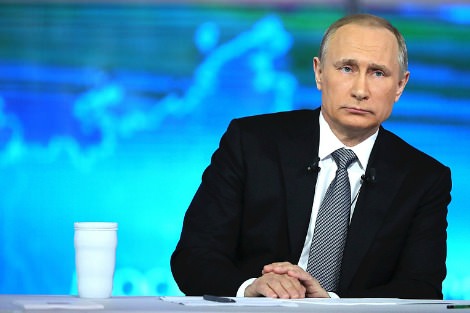
INTERNATIONAL
- Justin Glyn
- 15 November 2016
6 Comments
If a failure of empathy marks our understanding of internal politics, its effects are magnified, with even worse results, in the international arena. A classic example is Russia. Since the fall of the Soviet Union, the west has failed to take Russian interests seriously. I endorse neither the present Russian government nor its point of view. However, knowing that the other side has a point of view and what it is is vital in avoiding miscalculations. You don't get a second chance with nuclear weapons.
READ MORE 
-

ARTS AND CULTURE
- Tim Kroenert
- 05 October 2016
1 Comment
At the opening of the Environmental Film Festival Australia in Melbourne last week, festival patron and former Greens senator Bob Brown highlighted the movement against oil drilling in the Great Australian Bight. He painted a picture wherein a major spill in the region could lead to an environmental disaster stretching as far from the site as the NSW coast. His words make the release of Deepwater Horizon, about the disaster that led to the 2010 BP oil spill in the Gulf of Mexico, even more timely.
READ MORE 
-

AUSTRALIA
- Ruby Hamad
- 19 August 2016
10 Comments
This week, Israeli PM Benjamin Netanyahu claimed that although 'some of you will not believe' it, he 'cares more about Palestinians than their leaders do'. He is right - I don't believe him, not least because what he is saying is nothing new. Israel has long been claiming that it only harms Palestinians because Palestinians force them to do it. As well as making Israel sound remarkably like an abusive partner (Why did you have to go and make me hit you?) this is also Dehumanisation 101.
READ MORE 
-
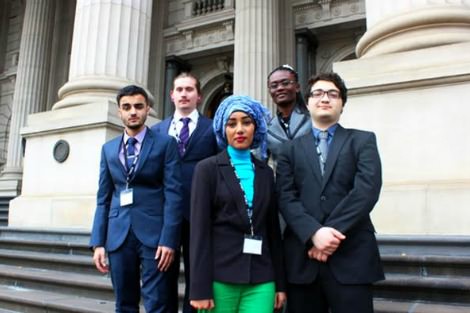
AUSTRALIA
- Katie Miller and Caitlin Meyer
- 29 June 2016
4 Comments
'I'm doing it for my kids.' This is how some supporters of Brexit explained their position before the referendum. Yet 75 per cent of voters aged 18 to 24 voted to Remain. It seems the message from 'the kids' to older voters was 'thanks, but no thanks'. The same can be seen in domestic politics here in Australia. We often hear politicians and voters talk about the effects of a policy on future generations. Yet the issues of concern to young people themselves simply don't get much attention.
READ MORE 
-

ENVIRONMENT
- Neil Ormerod
- 22 June 2016
23 Comments
It is now 12 months since Pope Francis issued his environmental encyclical Laudato Si'. He opined, 'Although the post-industrial period may well be remembered as one of the most irresponsible in history, nonetheless there is reason to hope that humanity at the dawn of the 21st century will be remembered for having generously shouldered its grave responsibilities.' Where are the Australian politicians who can give hope to the coming generation by focusing our attention on this most urgent issue?
READ MORE 
-

ENVIRONMENT
Many people have hoped that when global warming manifested itself as a concrete threat, politicians would be forced into action. Yet it's becoming horrifyingly clear that the political class is quite willing to let the Great Barrier Reef, one of the natural wonders of the world, slowly die. If we want to save the reef, we're going to have to do it ourselves. The Franklin dam blockade of 1982-1983 transformed the political climate and preserved an iconic river. We need to recapture that energy.
READ MORE 
-
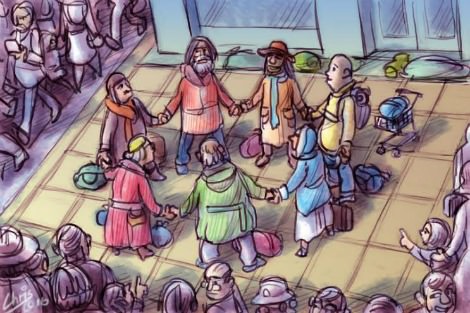
AUSTRALIA
- Tim Robertson
- 23 May 2016
8 Comments
I asked John, a tall, articulate man with long hair and well-maintained hipster beard, if he'd had a chance to read the most recently published Herald Sun think-piece arguing that what they are doing is not a demand for help, but a political protest. He smiled wryly, expelled a couple of bursts of laughter and said that that may be their most accurate reporting of the unfolding situation to-date: 'This has always been a political protest ... that's always been our intention.'
READ MORE 
-
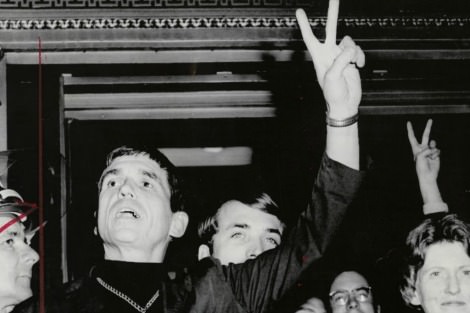
RELIGION
- Andrew Hamilton
- 04 May 2016
18 Comments
By many United States Jesuits including military chaplains, Dan Berrigan was seen as a divisive figure. I also found his actions challenging. I was still to move from my concentration on the goals of military action to focus on what happens to people who make war and have it made on them. Berrigan and others helped me to see the dishonesty in the conduct of the Vietnam war, the cost to Vietnamese civilians and to soldiers on both sides, and the corruption of ethical sensitivity in both societies.
READ MORE 
-

AUSTRALIA
The chants were thunderous and sustained, as the suited and elegantly coiffed guests began to arrive for the Liberal Party fundraiser at Docklands. Initially there did not seem to be a significant police presence, as if the need for security was not considered high. As the chanting rose to a crescendo, chaos ensued. The mounted police arrived; but there seemed no plan of crowd control. It was a small protest but it was locked into a contained area with only one entrance. Then the wounded started to emerge.
READ MORE 
-
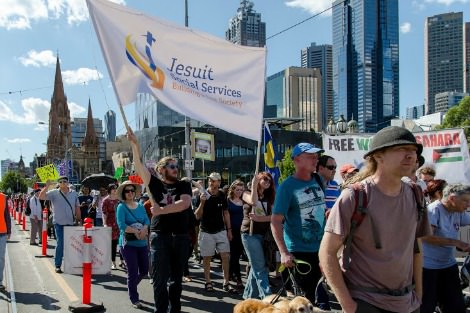
AUSTRALIA
- Moira Rayner
- 22 March 2016
18 Comments
When I received my invitation to 'lead' the Palm Sunday Walk for Refugees my first response was to ignore it. This was partly ego and partly disillusionment. It's true that in Melbourne at least 6000 people walked or struggled or strode along Spencer Street. But I no longer believe marches for huge national issues have any effect on local powerbrokers. I believe as Saul Alinsky said that the most powerful force for change is local activism on local issues and generational organisation from the grass roots up.
READ MORE 
-
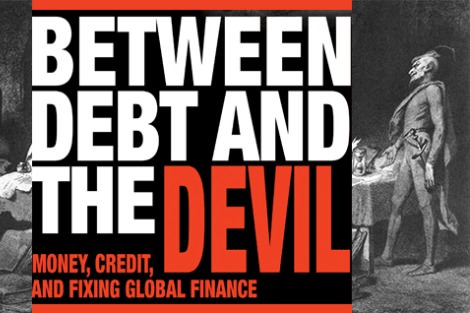
ECONOMICS
- David James
- 26 February 2016
8 Comments
It is not often that federal political parties exhibit courage. Labor's decision to change the rules on negative gearing is a rare instance. It targets what is most dangerous and unfair in our financial system. Expect howls of protests from powerful lobby groups if it ever looks like becoming policy. But these changes alone won't be enough to deal with the ills of the financial system. While they are designed to target the bias away from productive investment, they won't remove the attraction towards property.
READ MORE 
-
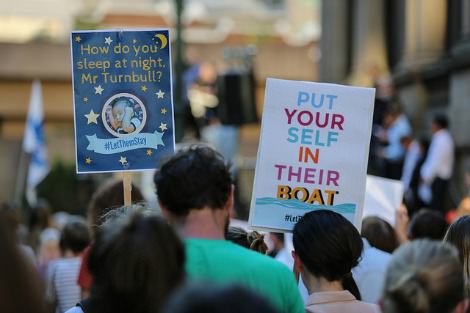
AUSTRALIA
- Somayra Ismailjee
- 12 February 2016
8 Comments
Since the first churches offered sanctuary to the refugees facing deportation to Nauru, a steady stream of voices have joined the call for compassion. As a political language, compassion is itself a reclamation of power. Extending safety, resources, or even a mere welcome to people in need proves that we have something to give. Strength is embodied by a capacity to aid and assist, rather than in cruelty. Empathy, care and compassion appeal to us on a level of emotion that runs deeper than mere rhetoric.
READ MORE 